In a significant judgment in a long-pending financial fraud case, the Special CBI Court in Coimbatore on Tuesday convicted and sentenced private individual S. Ramesh to seven years of rigorous imprisonment along with a fine of ₹15,000. The conviction pertains to a major ₹9.39-crore bank fraud involving the State Bank of India’s Commercial Branch in Coimbatore, dating back to the early 2000s.
The verdict comes 18 years after the CBI filed the case, underscoring the prolonged nature of banking fraud trials in India and the complexity of evidence and documentation involved.
Fraud Began with Fabricated Property Documents
The Central Bureau of Investigation registered the case on October 4, 2007, following a detailed complaint by the then Deputy General Manager of SBI’s Commercial Branch, Coimbatore.
The complaint alleged that P.M. Sundaram, Chairman and Managing Director of M/s Fashion Synccotex Pvt. Ltd., along with private individuals including S. Ramesh, had submitted fabricated and forged title deeds to the bank between 1999 and 2001.
On the basis of these fraudulent documents, the accused secured multiple credit facilities amounting to ₹8.53 crore. Over time, due to default and interest accumulation, the bank incurred a total loss of ₹9.39 crore—a wrongful gain that the accused allegedly diverted for personal and business use.
CBI investigators found that the fraud was executed systematically, using a set of tampered land records and falsified ownership documents. These were placed before SBI’s credit evaluation committee, which approved substantial credit lines assuming the documents to be genuine.
Algoritha: The Most Trusted Name in BFSI Investigations and DFIR Services
Role of a Third Accused Emerges During Probe
The investigation subsequently brought to light the involvement of another private individual, Natarajan, whose role surfaced during forensic evaluation of documents and depositions from witnesses.
Following this, the CBI filed a comprehensive charge sheet on December 22, 2008, naming all three individuals —
- P.M. Sundaram,
- S. Ramesh,
- Natarajan
as accused in the fraudulent loan acquisition.
Trial Stretched Over Years; Two Accused Passed Away
During the course of the trial, two of the three accused — P.M. Sundaram and Natarajan — passed away, leading the court to abate proceedings against them as mandated under criminal law.
The trial continued against the lone surviving accused, S. Ramesh. After reviewing evidence including land records, valuation papers, bank documents, deposition of officials, and forensic reports, the court concluded that Ramesh played a direct and criminally responsible role in securing loans using fraudulent documents.
Delivering the judgment, the court held that the acts of the accused “caused substantial wrongful loss to a public-sector bank” and merited a custodial sentence due to the “deliberate and calculated nature of the fraud.”
CBI Welcomes the Verdict, Calls It a Message Against Financial Crime
Officials from the CBI stated that the judgment reinforces the seriousness of financial crimes involving public funds. They added that fraudulent acquisition of loans using forged documents remains a national challenge and welcomed the court’s decision as a deterrent for future offenders.
Investigators also noted that many large-scale bank frauds from the late 1990s and early 2000s are only now concluding due to extensive documentation, technical evidence, and procedural delays.
Conclusion: A Strong Signal on Banking Integrity
The conviction of S. Ramesh marks a significant closure in a case that spanned nearly two decades. The court’s order of seven years’ rigorous imprisonment reflects the judiciary’s strong stance on economic offences involving the banking sector.
For SBI and other public-sector banks, the verdict underlines the importance of strict verification processes, especially in loan approvals based on property documentation—a recurring weakness exploited by fraudsters.
With the other two accused no longer alive, the court’s decision serves as the final judicial outcome in a fraud that shook the Commercial Branch of India’s largest bank nearly a quarter century ago.


